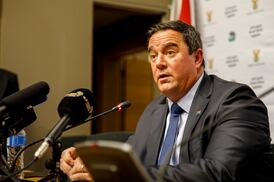Two government of national unity (GNU) parties, GOOD and Rise Mzansi, have partnered with Build One SA (Bosa) to contest the 2026 local government elections as a new centrist political party: Unite for Change.
The three parties are expected to fully merge only in 2029 after the seventh administration’s five-year term ends as they are all represented in the National Assembly and provincial legislatures.
Combined, the three parties have five seats in the 400-seat National Assembly. GOOD and Rise Mzansi form part of the 10-member GNU, though Rise Mzansi leader Songezo Zibi said the establishment of the new political party would not affect the coalition government.
“It is not possible for any political party that has been elected either to a council, to parliament or to the legislature to dissolve before that mandate has expired. The law does not allow it,” Zibi said. “I will continue to stand up in parliament as a leader of Rise Mzansi and as an MP until 2029.
“Following that election, there is an audit by parliament and the IEC [Electoral Commission of SA] of the support given to that political party in terms of constituency funding and so on. It must be fully accounted for by that political party.

“The parties remain. I think that’s a very important thing to distinguish, so that we understand that we’re working towards local government elections and where that goes,” Bosa leader Mmusi Maimane said at the announcement on Sunday.
An elective conference to select new leaders was likely to be held in 2027 or 2028. Before that an interim council of leaders would be chosen from among the three parties, GOOD leader and tourism minister Patricia de Lille said.
“In November of 2023 discussion started to engage with like-minded parties that share our values [and] our principles, and the elective conference amended the constitution of GOOD to allow the leaders to continue to engage [with other parties],” De Lille said.
The leaders’ council comprises Maimane, De Lille, Zibi, Bosa’s Nobuntu Hlazo-Webster (MP), Gauteng agriculture MEC Vuyiswa Ramokgopa (Rise Mzansi) and GOOD’s Brett Herron.
“The memorandum of agreement signed by all three founding parties states that the national executive committee will adopt a candidate selection model that prioritises merit-based selections in respect of all candidate lists,” the three parties said in a joint statement. “The model will have an intense focus on getting people to stand for election as councillors who are from their community, known in their community and accountable to their community.”
The memorandum of agreement also mandates a policy review process. This will measure every proposal against three tests: is it constitutional, is it evidence-based and will it expand opportunity for all South Africans?
“Where differences exist, we’ll reach consensus based on what is credible and works for the country. In the immediate term, the organising mission for policy formulation will be local government focused.”











Would you like to comment on this article?
Sign up (it's quick and free) or sign in now.
Please read our Comment Policy before commenting.